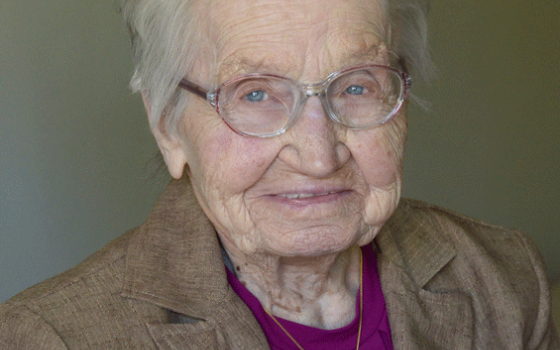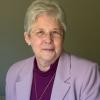It was 1982. I was a novice in our Minneapolis Poor Clare community when I first met Sr. Bernardone Reining, known to us all as Bernie.
I was restless, unsure of my calling and more than a bit of a rebel. Bernie had been a vowed Franciscan sister for 40 years and seemed quite content and happy in her calling. She was our community cook, as well as one of the most faithful in adhering to our strict religious prayer times.
I envied her remarkable inner peace and happiness with both her vocation and her Poor Clare sisters and found myself watching her, noticing how she responded to others. I saw that even though she was petite, she was strong.
It must have been growing up as one of 11 children on a farm without heat or electricity that made helping others and a willingness to work second nature to her.
When asked for help, she would always respond, "Sure." It became a friendly joke in the community. One sister told Bernie that we intended to see that the word "sure" was inscribed on her tombstone.
In the mid-'80s, our Minneapolis Poor Clare community considered experimenting with small groups that would live less institutional lives and be more connected with the lay community. The late and beloved Bishop Ken Untener of Saginaw, Michigan, heard of our interest and offered to rent a small home for four Poor Clares willing to form a contemplative, praying presence in his diocese.
Sisters Dianne, Laurene, Bernie and I responded to his invitation. We were a bit surprised that 75-year-old Bernie wanted to join us. We thought that at her age, she might prefer security rather than venturing into unfamiliar territory. She said to us quite happily, "This will be my last adventure."
Moving to Saginaw was harder than we thought it would be. We left behind family, community, and friends. The house we rented needed renovation and upkeep that would take many years to complete. Bernie was a willing helper with cleaning and painting. A Jill-of-all-trades with energy to spare, she mowed the grass until she was 82.
She made our house in Saginaw a home, managing our meals and our religious feasts. No matter the stresses of the day, we had a meal prepared for us, and on holidays, her fresh-baked breads and Christmas cookies comforted us. For several years, she made the eucharistic bread for funerals and weddings at a local parish.
The people of Saginaw soon kept us busy with their prayer requests, at first by telephone and later by email, as well. We received on average 50 prayer requests a day. We heard many sad stories but also shared many joys.
They invited us to speak at their churches, give prayer retreats, and lead seminars on how to pray. We often worked with groups interested in meditative prayer and quiet contemplation.
Bernie would get after us if we missed our own daily schedule of prayer.
"After all," she would say, "that is why the bishop brought us here: to pray."
Though a firm defender of monastic discipline, Bernie liked fun and had a good sense of humor. She also loved sports, especially baseball. In our early days in Saginaw, Bishop Ken would often unexpectedly drop by to watch a baseball game with Bernie. Bernie always rooted for the Minnesota Twins while Bishop Ken was an avid Detroit Tigers fan.
Another joy of Bernie's was her extensive family. On a home visit in 2000, she and her brother listed all their nieces and nephews and found they numbered 550. Bernie always had a long list of relatives who were pregnant and asked her for prayers for their safe deliveries.
A friend commented that Bernie's family made up an entire Catholic parish in themselves, even without counting their great-, great-great-, and great-great-great-nieces and -nephews.
In addition to staying in touch with her family, Bernie kept up with the national news, as well. She prayed especially for people suffering pain and caught in war. Before she went to bed, she would collect the daily newspaper and take it upstairs. With a glint in her eye, she would say, "This is my spiritual reading."
Bernie had a very tender heart for people and for our pets. We had a mini lop-eared bunny that was dear to us all, but especially to Bernie. Every afternoon, she would take him to our chapel to pray. She loved petting his soft fur. He would relax and stretch out in her lap. He also went with her when she watched the nightly news on TV.
During the summer, we kept his cage outside. One evening, Sister Laurene was sitting on the porch, and a visitor asked her what the cage was for. She said we had a mini lop-eared bunny, but right now, he was inside watching the evening news with Sister Bernie.
In 2016, Sister Laurene had a stroke, and it became clear that we could not care for her at home. At the same time, we were concerned about Sister Bernie, then 97. If she fell at night, we might not hear her.
That is when we began the serious and painful conversations with both women about their need for assisted-living care. It was painful for us. Sisters Dianne, Laurene and Bernie had lived in community for over 50 years. I had lived with them for almost 40 years.
Carefully, I brought up the subject with Bernie. She did not want it, and we did not want it for her. Tears came to my eyes. It was the hardest conversation I have ever had.
We talked about it three or four times, and I cried every time. At one point, Bernie said to me, "I think this is harder on you than on me."
Finally, I had to ask the question.
"Bernie, are you willing to move?"
In a quiet voice, she responded in her familiar way, "Sure."
We kept in very close touch with our sisters Bernie and Laurene after they settled in the nearby care facility. We visited with them several times a week and brought them home for family celebrations.
On Jan. 7, Bernie died peacefully. She was aware of our presence and our love for her.
Since her death, I have had a difficult time dealing with grief.
Bernie was a friend who shared my interests and my sense of adventure. As I have collected my memories of her, my grief has been slowly transformed from deep and painful sadness to deep thanksgiving.
I now realize that she was a sister and friend who changed my life. She never told me how to live; she showed me how to live and how to die. She has given me a new peace and patience with life and with my vocation. She has reminded me how the deepest joys and pleasures in life are often right before us.
She has shown me that saying "sure" to life and to death is a blessing indeed.
[Laura Hammel is a member of the Sisters of St. Clare, a Poor Clare community in Saginaw, Michigan. In addition to the prayer ministry in her diocese, she has developed and maintained a website introducing different prayer forms useful at certain times of the year.]

